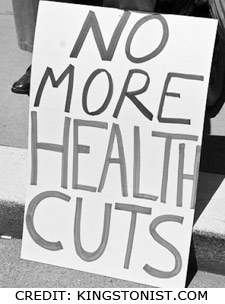Ontario Health Coalition sparks health care debate

With recent hospital bed cuts and supposed longer wait times, it's no surprise that advocacy groups like Ontario Health Coalition are calling foul on the Ontario government's recent cuts to the heath care system budget. The OHC is against provincial health care budget cuts and is advocating for improved health care.
Journalist Philip McLeod grew up during the infancy of the Canadian public health care system. There was almost no public health care when he was a child, but by the time he was having kids of his own, health care was universal. He is now asking if health care has come full circle. Has it become too social, commercial and, most importantly, too expensive?
“Suddenly a system that has saved so many lives, both medically and financially, is under attack,” McLeod said at a mid-May town hall meeting in London hosted by Ontario Health Coalition on health care cuts in the provincial budget.
Ontario ranks eighth out of the 10 provinces for health care spending, yet the 2012 provincial budget suggests major funding cuts in the health care system.
On March 27, the provincial budget was released, and with it came cuts adding up to $17.7 billion over the next three years. A lot of these cuts can be found in Ontario's health care system.
Spending increases have been capped at 2.1 per cent, which is way down from the 6.1 per cent annual increases since 2003. While Natalie Mehra, director of Ontario Health Coalition, said she believes that doctors' salaries are out of control, salaries and overall hospital operating costs have been frozen. These freezes have forced simple, routine procedures to shift from hospital care to community clinics and family doctors.
“We are in a situation where hospital spending in Ontario has been declining ever since I can remember,” said Mehra. She talked about the province's plan to move people from hospitals to community- based care. Even with a four per cent increase in funding for community- based health care, Mehra warned that there is still too little money and manpower in the community- based system to accommodate the shift. “The truth is that home care funding has been declining as a share of health care spending for the last decade, as well.” The OHC is looking to increase the level of care provided by the Ministry of Health. A raise in taxes, educational programs and overall awareness are ideas the coalition proposed to stop the budget cuts.
On the other hand, provincial health minister Deb Matthews has stressed in the past that health care funding has not been cut but has seen a 2.1 per cent increase. And while that is still lower than previous annual increases, it still means there is money being put into the health system.
“The Ontario Health Coalition is a coalition of unions. They have a long history of being highly critical of the health care system,” Matthews said. “I agree with the Ontario Health Coalition that there's more to be done, but we're taking all the right steps to ensure the highest degree of patient safety possible. Is there more to do? Yes. But have we come a long way? Absolutely.”
The OHC is spreading its message to 15 of Ontario's large cities in May and June. The coalition will visit another 20 smaller towns and communities after its larger scale meetings are finished in mid- June.













